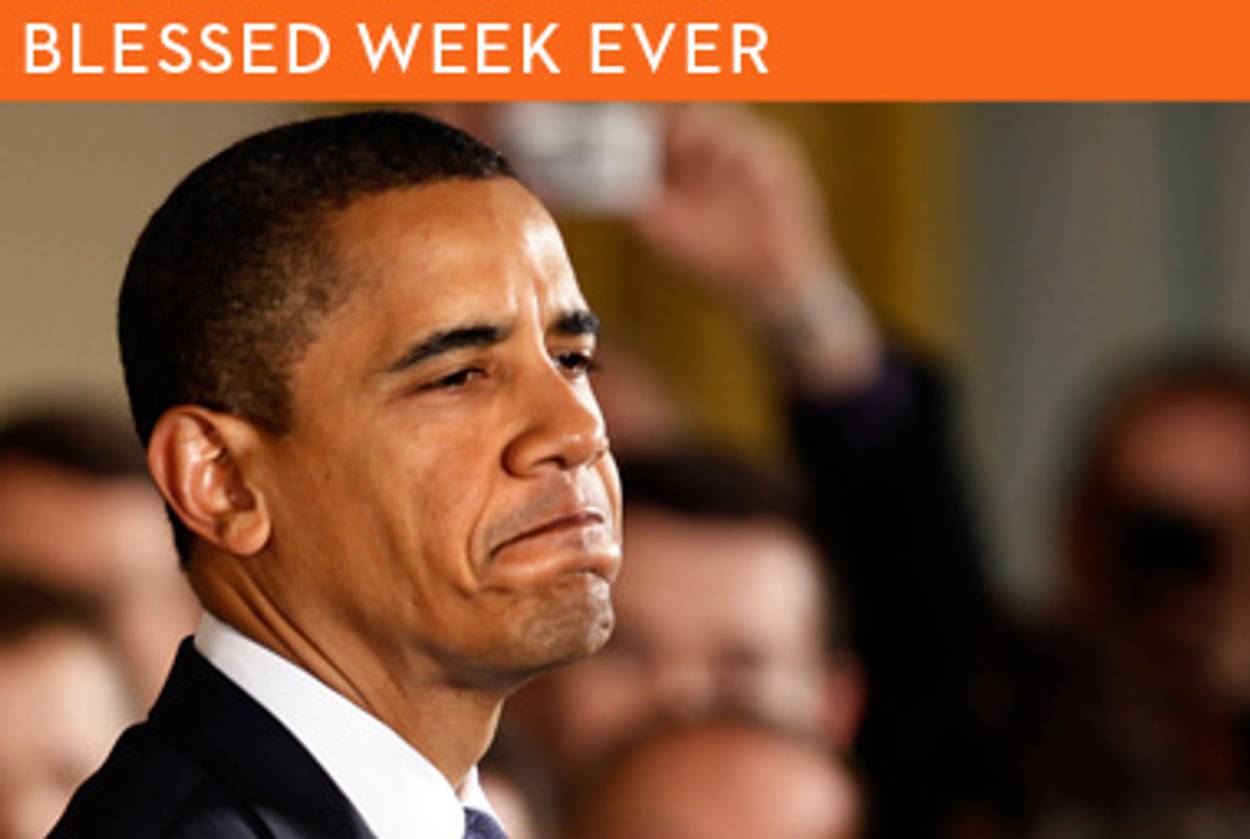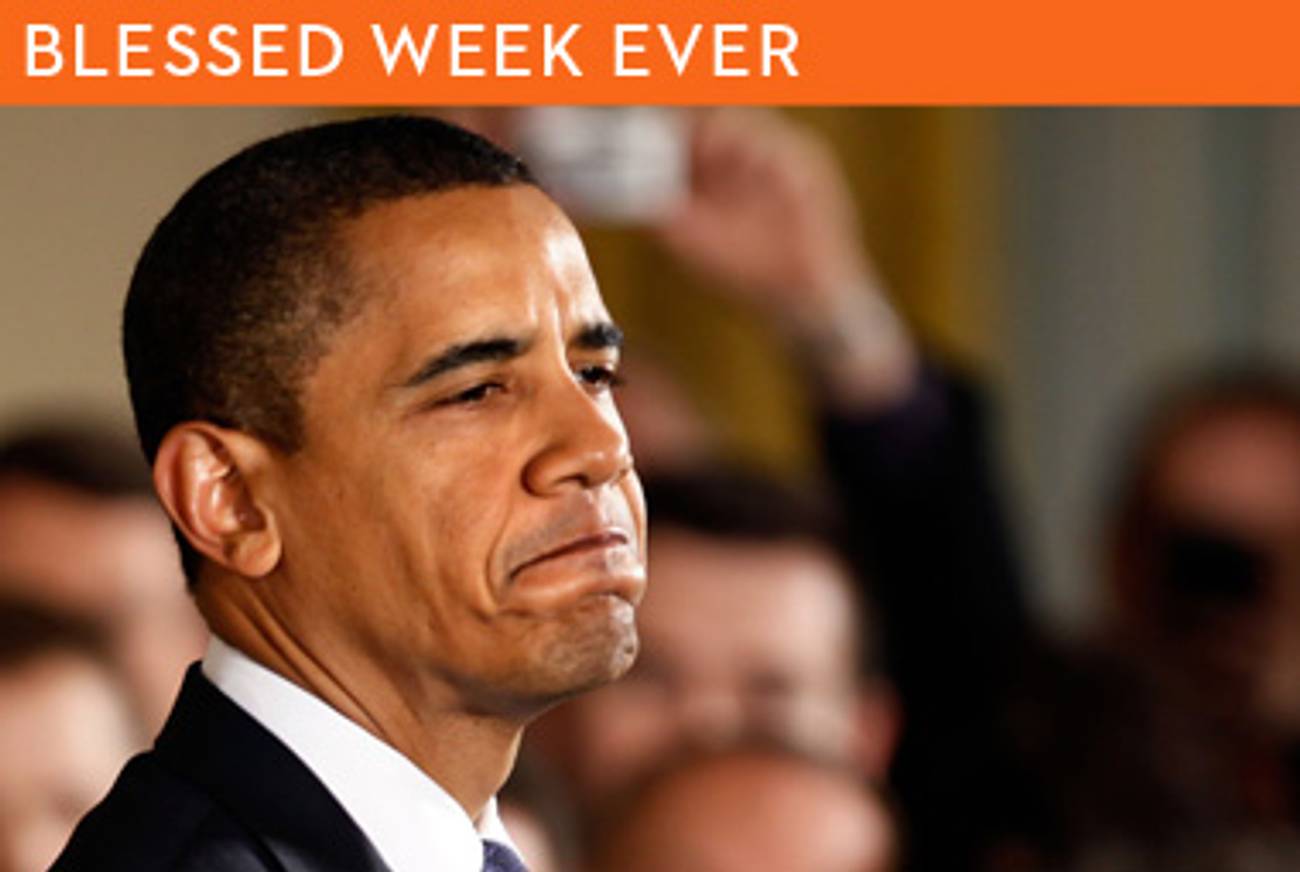Lonesome Dove
Barack Obama isn’t to blame for the Tea Party’s surge. Liberals are. And if they want him to win re-election in 2012, they better listen to Moses and learn how to take initiative.




Among us morose liberals, the story of next year’s election has already been written. It goes like this: Once upon a time, there was an extraordinary candidate named Barack Obama who, with a gentle kiss of rhetoric, woke us up from a decade of slumber caused by the curse of the evil George W. Bush. We were looking forward to living happily ever after, but then Obama took an unprincely turn. Instead of standing up to the tea-stained meanies who called him names and besieged his castle, he went weak. He tried to appease, and he ended up compromising his principles. He failed, according to a recent essay in the New York Times by psychologist and political consultant Drew Westen, to offer “a clear, compelling alternative to the dominant narrative of the right.” He let himself be bullied by a doctrinaire and dogged minority. And so, no matter how the majority of Americans vote come next November, our story already has an unhappy ending: We believed in Obama, and he has let us down.
It’s a compelling story, but it’s also dead wrong. Obama hasn’t let us down; it’s we who have disappointed him.
Our betrayal of the president might have been more ontological than political. It has to do with the way we perceive ourselves. Modern liberals, for the most part, are the children of Emerson. We believe, as our spiritual father wrote, that “He who would gather immortal palms must not be hindered by the name of goodness, but must explore if it be goodness. Nothing is at last sacred but the integrity of your own mind. Absolve you to yourself, and you shall have the suffrage of the world.”
We absolve us to ourselves on occasion, as my friends and I did in 2008 when we went canvassing for Obama among Pennsylvania’s undecided voters. The night Obama was elected, I was huddled with hundreds of strangers in a hotel ballroom outside Philadelphia, feeling elated. This, I thought, is how movements were forged, by scores of mindful men and women sticking together in the heat of a big idea. I hugged a lot of people that night. I never saw any of them again.
Meanwhile, on the other end of the political spectrum, movements are defined differently. For conservatives, politics are played not in four-year intervals but weekly, like football, in churches and school boards and living rooms, where a great number of people congregate to define for each other and for themselves the values worth living by and fighting for. A 2010 Gallup poll, for example, found that while 27 percent of self-described liberals frequently attended a house of worship, the number among conservatives was 55 percent. For these Americans, there’s a lot out there that’s far more sacred than the integrity of their own minds.
This may explain the occasional, and maddening, discrepancies in public opinion polls. A recent New York Times/CBS poll, for example, found that while 72 percent of respondents “disapproved of the way Republicans in Congress handled the negotiations” over the debt ceiling crisis, 44 percent echoed Republican calls for more spending cuts by saying that “the cuts in the debt-ceiling agreement did not go far enough.” You could explain such contradictions by arguing that many Americans may be misinformed, or, less charitably, by proclaiming them irredeemably illogical. Another explanation may be that movements are agnostic when it comes to facts, and that what really matters to tea partiers when they congregate isn’t trying to resolve their ideological tensions—like the discrepancy, say, between railing against big government on the one hand and supporting invasive legislation pertaining to abortions or abstinence on the other—but rather celebrating their successful congregation.
Movements are selfish; they want to survive. If they stopped to question the viability of their arguments, they’d drown in a shallow pool of self-doubt. Instead, they make up slogans and pass resolutions and produce other simple and clear badges for their members to wear to distinguish themselves from non-members. As anyone who has ever attended any brand of religious school and was forced to come to terms with the inscrutable actions of God very well knows, sometimes the answer to the most difficult theological questions is “just because.” It’s not a sophisticated answer, nor is it satisfying for those of us inclined to explore each thought and idea for ourselves, but it’s not a categorically bad answer. When we march under a banner, when we identify the group’s interests with our own, when we belong to a movement, we do so, often, just because.
And by we, alas, I don’t mean liberals. They—we—demand explanations. We’re willing to get behind Obama, but only for short bursts at a time, and only provided that he act in a way we perceive of as befitting the image we have of him, that of our knight and savior. That’s no way to build a movement.
When he faces the Republicans, the president knows that his is a battle of one against many. “In similar circumstances,” Westen wrote in his Times essay, “Franklin D. Roosevelt offered Americans a promise to use the power of his office to make their lives better and to keep trying until he got it right.” True, but FDR had the support of the unions, then still a growth industry, as well as that of various well-organized political machines and ethnic minorities—Jews, blacks, Catholics—likely to belong to communal organizations in far higher numbers than they do today. When he talked tough, he knew he had in his corner millions of Americans who met each week and cherished their communal bonds and listened to their rabbis or priests or foremen. Obama has no such privilege. Without it, his power is greatly diminished. A president is still a politician, and a politician whose voters show up once every four years finds himself, in the remaining 1,459 days, forced to bend before his better-organized, more numerous foes.
A church-going man, Obama can, perhaps, find some solace in another leader of a stiffed-necked people, Moses. In this week’s parasha, the dying patriarch teaches the Israelites about the perils of political paralysis. He warns his followers not to perceive their triumph over their enemies and their entry into the Promised Land as a sign of entitlement. “Not because of your righteousness or because of the honesty of your heart do you come to possess their land,” Moses roars, “but because of the wickedness of these nations, the Lord your God drives them out from before you, and in order to establish the matter that the Lord swore to your forefathers, Abraham, Isaac, and Jacob.”
The message is clear, and it is twofold: First, if the wicked inhabitants of Canaan had once incurred the wrath of God and were punished by extinction, then the land’s new custodians can expect the very same fate should they neglect their duties. And second, as the land was once inhabited by wicked nations and is now being delivered to the Israelites by way of wars and conquests, it is, by definition, an earthly place: Canaan is not Eden, and the only thing that makes the Promised Land promised is the willingness of its inhabitants to work hard at justice and compassion. Put simply, Moses is telling the Israelites about to enter Canaan the same thing that Obama should have told me and my friends at that Pennsylvania hotel, as well as all of his supporters, on the eve of his election—winning was the easy part, and the hard work is only now beginning.
Whether or not Obama secures a second term next winter is largely irrelevant. If we want real change—the kind we can believe in—we’re going to have to write our own story, and America’s, by committing ourselves to a movement on an ongoing basis. We can take heart from Wisconsin, where more than 100,000 members and supporters of unions—for many of us, still churchlike institutions—banded together to oppose Gov. Scott Walker’s attempt to slash collective bargaining rights for public sector unions. Walker got his way, but a well-organized progressive movement succeeded in bringing about numerous recall elections and taking two seats away from Republican elected officials. They didn’t win control of the state senate, as some had hoped, but they kept the spirit of organization inflamed with calls, meetings, rallies, and the other movement mainstays. That’s a stellar start.
There’s no other way to succeed save for this serious commitment to a deeply imperfect political vehicle. It’s not going to be easy—we’re likely to find many of our fellow travelers repellent, and we will likely be forced to make some decisions that would leave us less than pure. It’s not going to be much fun—there are more thrilling pastimes in life than canvassing, phone banking, lobbying, or serving on community boards. But when it comes to politics, it’s the only story worth telling.
Liel Leibovitz is a senior writer for Tablet Magazine and a host of the Unorthodox podcast.
Liel Leibovitz is editor-at-large for Tablet Magazine and a host of its weekly culture podcast Unorthodox and daily Talmud podcast Take One. He is the editor of Zionism: The Tablet Guide.